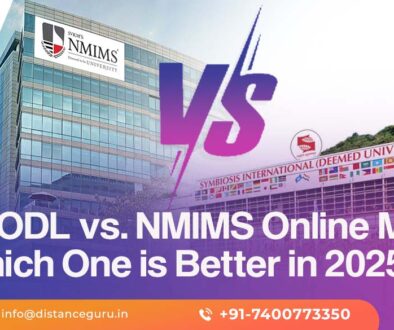Key Differences Between Online MBA and Executive MBA Programs
Apply Now for Online Courses
Counselling for Online MBA
Although online MBA and executive MBA programs have similarities, such as catering to working people and offering flexible study opportunities, they differ in important ways. Understanding these distinctions might help you select which curriculum is best suited to your career objectives.
Target Audience
Online MBA programs: They typically attract individuals at all phases of their employment, including early, mid, and senior levels. Because the format provides for flexibility, it appeals to people who do not have extensive managerial experience but want to progress in their careers or transition to other roles.
Executive MBA: The EMBA is designed for seasoned individuals with extensive job experience. Candidates normally hold managerial positions and have at least five to ten years of professional experience. The program is designed for professionals who want to improve their leadership skills and advance to executive or C-suite positions.
Eligibility requirements
An Online MBA has more flexible eligibility criteria than an EMBA. While some work experience is required, many schools will accept individuals with little to no managerial experience, particularly those with a strong academic background. Standardized exam scores (such as the GMAT or GRE) may be required, but some schools waive these requirements for candidates with extensive practical experience.
An Executive MBA program requires extensive job experience. Most programs require five to ten years of experience, with certain schools preferring candidates in leadership roles. The emphasis is on career accomplishments and professional development rather than academic performance. Standardized exam requirements are frequently dropped, given candidates’ professional backgrounds.
Program Duration and Structure
Online MBA programs: The duration of an online MBA program varies greatly. Some programs can be finished in as little as a year, while others may require two to three years. The structure is quite flexible, with both part-time and full-time choices available. The education is frequently organized into modules, and students can select how many courses to take at once, allowing them to speed or slow down their studies based on their schedules.
Executive MBA: EMBA programs are often shorter, ranging from 12 to 24 months. The structure is less adaptable than an Online MBA, with classes held in a cohort format. The timetable is meant to accommodate working professionals, with programs typically held on weekends, evenings, or intense week-long.
Learning Experience
Online MBA: The learning experience is largely self-directed, with students accessing course materials, lectures, and assignments via an online platform. Peers and professors frequently interact through virtual discussion boards or video conferencing. This form of learning necessitates excellent time management and self-discipline.
Executive MBA: The EMBA learning process is more participatory and collaborative. Classes are frequently held in person or in a hybrid format, allowing for face-to-face interaction with classmates and teachers. Group work, case studies, and real-world projects are popular, and the cohort approach promotes a strong sense of community and networking among participants. The in-person component allows for more dynamic exchanges and peer learning, which are essential for leadership growth.
Curriculum Focus
Online MBA: The curriculum often covers a wide range of business principles, such as finance, marketing, operations, and human resources. Elective courses may be available to students who want to specialize in data analytics, entrepreneurship, or digital marketing. The emphasis is on offering a thorough grasp of company management that can be applied across a variety of industries.
Executive MBA: The EMBA curriculum emphasizes strategic thinking and leadership skills. It focuses on executive-level issues such as strategic decision-making, corporate governance, global leadership, and organizational behavior. The training is intended to provide students with the abilities required for high-level management and executive positions. Case studies, business simulations, and leadership workshops are frequently included in the curriculum.
Costs and Financial Considerations
Online MBA Costs: The tuition fees for an online MBA program in India typically range between INR 1 lakh and INR 10 lakhs. The cost is determined by the institution’s reputation, the length of the program, and the resources available. Additional Expenses can include technology fees, examination fees, and supplementary resources like study materials or online workshops, which normally cost between INR 20,000 and INR 50,000.
Executive MBA Costs: Tuition prices for an Executive MBA program in India normally range from INR 10 lakhs to INR 40 lakhs or more, depending on the institution and program prestige. Executive MBAs frequently include charges for international residencies, workshops, and networking events, which can add an additional INR 2 lakhs to INR 5 lakhs to the total program cost.
Networking Opportunities
Online MBA: While online MBA programs offer networking opportunities, they are frequently more limited than an EMBA. Networking can take place through online discussion forums, virtual gatherings, and alumni networks. However, a lack of face-to-face engagement can make it more difficult to establish meaningful, long-term professional connections.
Executive MBA: Networking is one of the most important parts of an EMBA. The cohort-based structure enables students to build close bonds with their peers, who are frequently senior professionals from a variety of professions. EMBA programs also include possibilities for international residencies, executive seminars, and alumni gatherings, allowing for high-level networking and relationship-building.
Career Outcomes and Job Prospects
Online MBA: Graduates of online MBA programs might expect professional development, income rises, and new employment prospects, particularly if they have improved their abilities in a specialized field. However, because online MBA schools draw a broader spectrum of students, career results can vary depending on individual backgrounds, work experience, and the program’s reputation.
Executive MBA graduates frequently see strong career advancement and may move into executive or higher-level leadership positions. The curriculum’s emphasis on strategic management and leadership abilities qualifies students for positions such as CEO, CFO, and COO. The robust alumni network and well-known peers also provide valuable connections for job success.
Online MBA vs. Executive MBA: Which Should You Choose?
Your career ambitions, work experience, and personal circumstances will ultimately determine whether you pursue an Online MBA or an Executive MBA. Here are some points to consider before making your decision:
Choose an Online MBA If:
- You are in your early career or have limited managerial experience.
- You require a flexible program that can be adapted to your schedule.
- You’re seeking a cheaper choice without sacrificing quality.
Frequently Asked Questions
Who should consider an Online MBA over an Executive MBA?
Answer:Early-career professionals looking for flexible study can consider an online MBA.
Is work experience essential for an online MBA or an executive MBA?
Answer: An online MBA typically requires less experience, but an EMBA requires 5-10 years.
Which is more expensive, the online MBA or the executive MBA?
Answer:Executive MBA programs are typically more expensive than online MBAs.
How do networking opportunities compare between Online MBA and EMBA?
Answer: Because of cohort-based learning and in-person events, EMBA programs provide better networking opportunities.
Can I pursue an online MBA or EMBA while working full-time?
Answer: Yes, both programs are geared toward working professionals with flexible schedules.













